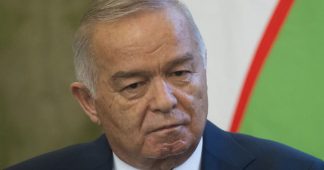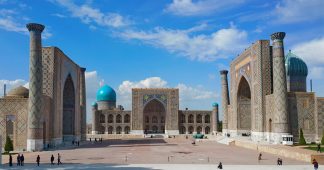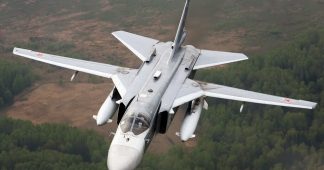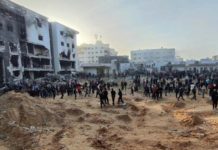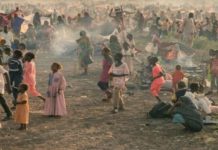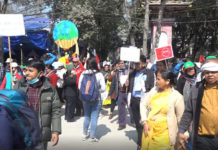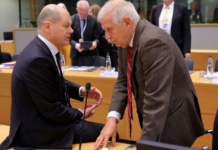The Karimov assassination…
By Nedret Ersanel
There were only a few days left for the 25th anniversary of the independence of Uzbekistan, but now, concern is more prevalent over Tashkent than celebrations.
The latest news on the health condition of Uzbek President Islam Karimov, who was admitted hospital on Aug. 29, is filled with the term “critical.”
Since hiding information on the health condition of leaders and in fact on whether they are alive or not is part of the Soviet legacy, the hearsays that rose in the early hours are yet to calm at the time of writing these lines.
Now, it is being said that Karimov has died and preparations are being made in his city of birth, in Samarkand. It really doesn’t make a difference, in any case, the “meaning” of Uzbekistan, as much as its leader, needs to be read from the start without the localized letters.
While the Western front has been losing extraordinary positions in the “Great Middle East Map,” Uzbekistan might be the new cover.
Questions Ankara is curious about
Everybody needs to face it; there is going to be a political transition in Uzbekistan, which, until now, was considered the oasis of stability, leading to serious outcomes in terms of the security of the region covering the country and Turkey.
In addition, there are suspicions that Tashkent’s balances have been tampered with.
Fergana valley is “an 800,000-square-kilometer wide area that encompasses the pool including the Uzbek, Kyrgyz and Tajik states.” By adding Turkmenistan to the mix, you can “stir anything in this bowl” to present it to an East-West settlement of accounts.
This is where one of the open wounds of the chaos now is.
It is possible to say that Russia, the U.S. and China will intervene in the transition period. Because Uzbekistan is in the “middle” of them all.
Karimov had settled this trio balance in its place. Even the Russians had learned that Karimov should not be pushed too much. Hence, the country was balanced in terms of both politics and economy.
Today there seems to be three candidates for Uzbekistan’s leadership, with each one of them leaning on another global shoulder and different internal advantages.
We know who is close to the U.S. and who is close to Russia. The one who adds the security apparatus to their political power will win. The lands there are a little rough, so the apparatus’ candidate is having trouble staying on his feet and the Kremlin has the advantage.
If you can’t run it, destabilize it
The strategic liberation point is that the political imbalance in Uzbekistan is going to create regional sensitivities due to Afghanistan.
If the transition is not a smooth one, in other words, if the valley collapses on the Afghanistan-Pakistan-India domino, the last domino will fall into the Mediterranean.
As it comes, bringing all the others down, it will crush the Iran-Iraq-Syria axis once more. And the dust and smoke that rise will stick to us and our eyes.
Because all that is currently happening in the region contain and animate the complications of the “Green Generation” DNA that are transferred to the present times. This is why the Gülenist Terror Organization (FETÖ) is also included in that map.
The likelihood of groups in Afghanistan becoming involved in the conflicts bred by the political uncertainty is a real danger. Karimov had prevented the Afghan civil war from spreading to Uzbekistan. The one who replaced him might not be able to succeed and in fact, he might “not be successful.”
Karimov had also made important cooperation with Pakistan to fight against the Taliban regime in Kabul. Because there were certain Uzbek groups as well at Taliban’s camps.
Stratfor, which knew the plane Erdoğan was on, knew this
Let’s send a salutation here to Kyrgyzstan. After July 15, Ankara warned Bishkek about FETÖ activities and in fact drew attention to the likelihood of a coup from the most authorized figures.
It was not heeded.
Ok.
Karimov was admitted to the hospital on Aug. 29. On Aug. 30, a suicide attack was carried out with bomb-laden vehicles on the Chinese embassy in Bishkek. (“Suicide bomber targets Chinese embassy in Kyrgyzstan,” CNN.)
Were our Kyrgyz brothers able to understand this?
You can find the clues – and even the map – of why China was attacked as Karimov was taken to hospital on the pages of Stratfor, which posted the coordinates of President Recep Tayyip Erdoğan’s plane on the night of July 15. (“China: The Dilemma of International Intervention,” 06/01, Stratfor.)
One other clue is, as you can see, the date is January 2016. The date it was posted on Stratfor’s Twitter account? Aug. 30!
If Bishkek thinks it is more alert than Tashkent, is it wrong.
Hence, despite his advanced age, Karimov’s illness/death must be doubted.
There should be nobody left who has not yet understood that Taliban, Daesh and all kinds of their “derivatives” are the extensions of those who are trying to gain control over the region’s countries. Russia and China see this too. (“Cooperation between regional, world powers essential for returning durable peace in Afghanistan,” 28/08, Xinhua.) This is why, on Aug. 31 – while Karimov’s condition was obvious – Russian President Vladimir Putin celebrated both Uzbekistan’s “Independence Day” and wished their leader health.
Karimov had special relations with Russia. Yet he put every offer that came from Moscow through the X-Ray machine. He was also cautious toward China. Similar to the Kremlin, Beijing did not push him either.
Karimov built a higher caution line for the West. But the West pushed this. It is possible to sense that it is happy about the likelihood of Uzbekistan’s independent politics and bright economy collapsing today.
As for relations with Turkey…
Ankara was naturally at a point of picking up relations with the Karimov administration. The Turkish public preferred Uzbekistan.
